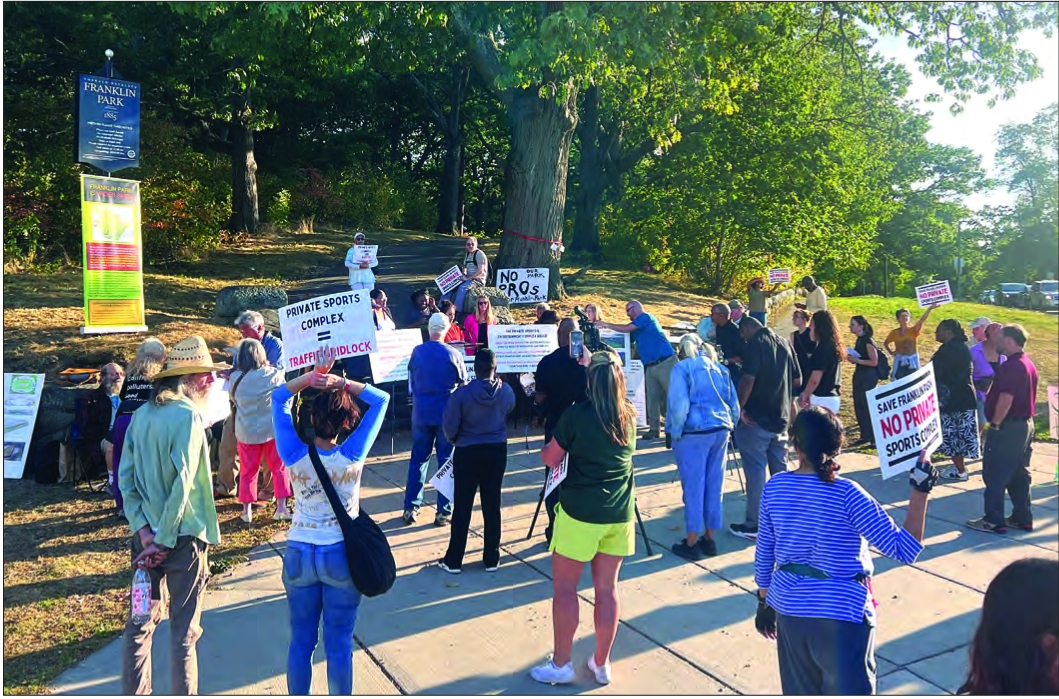
Ahead of the Boston School Committee meeting Sept. 11, neighbors and supporters held a rally in Franklin Park to protest the proposed White Stadium renovation. Area residents and park supporters hold opposition rally prior to vote
The Boston School Committee last Wednesday approved unanimously the White Stadium renovation plan, shortly after a group of community members, Franklin Park neighbors and elected officials gathered at Franklin Park to protest the project.
The committee’s 5-0 vote authorized Superintendent Mary Skipper to enter into a lease agreement with project developer Boston Unity Soccer Partners, which would allow the city to move forward with the demolition of the sports arena in the fall.
The proposed overhaul would refurbish the 75-yearold stadium, furnishing it with upgraded amenities as it is prepared to be the home of a professional women’s soccer team that would use the 11,000-acre grounds alongside Boston Public School students.
“White Stadium, as we all know, has been in disrepair for far too long … our student-athletes deserve to have access to a modern multiservice facility and the resources to support them,” Skipper said before the vote. “White Stadium is a key part of the city’s efforts to improve access to athletics for all BPS students.”
The public comments at the Sept. 11 Boston School Committee meeting underscored the divisive nature of the White Stadium plan, which has stirred a monthslong controversy. During the meeting, some voiced strong opposition
to the project and others endorsed it, while many continued to raise
concerns about how the repairs, which include expansion, would affect
abutters.
“Our
community is being told to accept changes that we didn’t ask for and we
don’t want,” said community activist Jean McGuire during the school
board meeting. She continued, “Our public land is precious and it needs
to be protected for future generations. If this proposal was really
about helping Boston’s students, the proponents should donate their
money to charity or to partner with the city to invest in a public
stadium with no strings attached.”
Shortly
before the vote, McGuire, other members of the Franklin Park Defenders
group and community supporters held a rally in the park, many holding
signs that read “Save Franklin Park, No Private Sports Complex.”
“We
all love Franklin Park. We love White Stadium. We want to take care of
these things. We want these to be available and accessible to all of
us,” said Karen Mauney-Brodek, president of the Emerald Necklace
Conservancy, at the rally, adding that the stadium can be restored while
keeping it “available to the public.”
Mauney-Brodek
echoed a previously shared sentiment that the $50 million the city is
set to invest in improving the facilities should be used only for Boston
Public School kids and the public, or that the proposed price tag was
too high.
During the
school board meeting, Carla-Lisa Caliga, one of the Franklin Park
Defenders, said the community did not need the other addons proposed by
the project developer, naming intended features such as the beer garden
and jumbotron.
“This
is our tax money, and we can do better,” she said. “We can renovate
White Stadium for our children and for the community with less money.”
State
Rep. Chynah Tyler, who represents the 7th Suffolk District, made an
appearance at the rally, siding with community members who are against
the public-private partnership between the professional women’s soccer
team and the city.
“It
is clear that the process taken to get to where we are today is
obviously flawed, and it does not include the most important part of the
most important elements of the process, which is you all today, the
voice of the people,” she said, adding, “We demand that our voices are
leading this effort.”
City
Councilors Ed Flynn and Erin Murphy stopped by the demonstration, both
speaking in favor of the redevelopment but condemning the privatization
of White Stadium.
During
the school board meeting, those agreeing with the restoration said it
would be advantageous for Boston Public School students who needed new
and improved facilities.
“We
firmly believe that the renovation of the stadium will significantly
help the families and the kids and the small businesses that will … get
great benefit from that renovation,” said a mother of two sons speaking
through an interpreter.
“The students and the youth, they’ll be able to use their time wisely … by using this space.”
A
student from the Margarita Muñiz Academy also showed up to back the
White Stadium project, saying the students needed a new athletic center
and “deserved the best [facilities] to enjoy.”
Even
among those who were for the revamp, some expressed continued concerns
about traffic, parking and noise levels on game days. One community
member said, if the plan were to move forward, he worried about what the
30-year lease would mean for the city and asked that those involved in
the project keep the community involved.
“What’s
really important is that you make the negotiations public,” he said.
“They need to be transparent. They need to be registered. They need to
be something that we can come back to.”